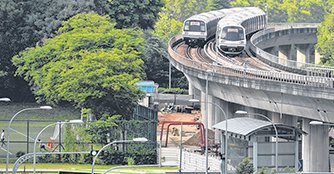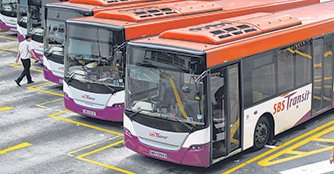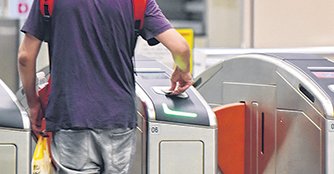Singapore public transport system tops global list
23 Aug 2018|4,405 views
Singapore residents are highly satisfied with the public transport system, which is among the best in the world, based on a report by consulting firm McKinsey. The June report, called 'Elements Of Success: Urban Transportation Systems Of 24 Global Cities', also lauded the transport system's affordability and efficiency. The level of satisfaction with the public transport situation in Singapore was 86% among those surveyed, added the report.
"The residents greatly appreciate their transport system and how it has evolved over the last (few) years - they are the most satisfied on 13 out of 14 aspects analysed," said the report. It added that electronic services such as trip planners are what residents in Singapore enjoy most.
The 24 major cities featured in the report include Shanghai, London, Seoul and New York, and were selected based on size, level of economic development, transportation system characteristics and data availability.
Four of them - Berlin, Hong Kong, Shanghai and Singapore - were chosen because their transportation systems are considered outstanding by external institutions such as the TomTom Traffic Index.
The five metrics used to measure the transportation systems were - availability of transportation, affordability, efficiency, convenience and sustainability. Based on these metrics, Singapore's overall transport system was ranked first among the cities studied. Its public transport system was ranked second, after Hong Kong.

It added that the fare review and new measures introduced in Singapore in 2013 were a major step towards affordability.
These included a 15% discount on adult fares for low-wage workers, free travel for children and seven other concessions, which benefited more than a million passengers, the report said. It also lauded the convenience and flexibility of the ticketing system as another 'outstanding feature', and made reference to the ez-link card.
The study conducted a survey of 400 people in each of the 24 cities, with respondents matched to the age-gender ratio of the cities. It asked them how satisfied they were with their transportation system right now, and with the changes they have seen in the past three to five years.
Besides Singapore, other Asian cities in the top 10 for public transport included Hong Kong, Seoul and Beijing. In Hong Kong, 83% of residents surveyed were satisfied with the overall public transport situation.
The report said Hong Kong's system has one of the best public transport coverage ranges in the world, with 75% of the population and 94% of workplaces being within 1km of a metro station. The city's ticketing system, the Octopus chip card, also ranked number one, alongside Singapore's ez-link card.
The report said the Octopus card is used by 99% of residents not just for payments but also for non-payment uses such as office building access. Together with Singapore and Paris, the report also lauded Hong Kong's public transport safety, with the three cities having much lower rates of public transit fatalities per million people compared with other cities.
Hong Kong's use of apps in the public transport system was another positive - one of the apps is even able to help the visually impaired use, for example, Google Maps. Seoul ranked in the top three for its public transport efficiency, with McKinsey saying that 'Seoul and Singapore are distinctive in average wait time and share of dedicated lanes'.
As for Seoul, the report said, "Such progress is driven by the optimisation of bus routes and construction of exclusive median bus lanes that increased bus speeds by an average of 30%."
The city also has an intelligent bus management system that helps buses stay on schedule. Like Hong Kong, Seoul scored high marks for its rail and bus network coverage. The city attained an 84% satisfaction rate for the overall public transport situation.
The report found that residents are able to use transport apps and access Wi-Fi in buses as well as at metro and bus stations. Beijing was lauded for its comfortable transport system, with the report finding that the city has one of the most modern transport fleets. It also surpassed Singapore in its rail infrastructure ranking, coming in 10th, ahead of Singapore's 12th.
Singapore residents are highly satisfied with the public transport system, which is among the best in the world, based on a report by consulting firm McKinsey. The June report, called 'Elements Of Success: Urban Transportation Systems Of 24 Global Cities', also lauded the transport system's affordability and efficiency. The level of satisfaction with the public transport situation in Singapore was 86% among those surveyed, added the report.
"The residents greatly appreciate their transport system and how it has evolved over the last (few) years - they are the most satisfied on 13 out of 14 aspects analysed," said the report. It added that electronic services such as trip planners are what residents in Singapore enjoy most.
The 24 major cities featured in the report include Shanghai, London, Seoul and New York, and were selected based on size, level of economic development, transportation system characteristics and data availability.
Four of them - Berlin, Hong Kong, Shanghai and Singapore - were chosen because their transportation systems are considered outstanding by external institutions such as the TomTom Traffic Index.
The five metrics used to measure the transportation systems were - availability of transportation, affordability, efficiency, convenience and sustainability. Based on these metrics, Singapore's overall transport system was ranked first among the cities studied. Its public transport system was ranked second, after Hong Kong.

It added that the fare review and new measures introduced in Singapore in 2013 were a major step towards affordability.
These included a 15% discount on adult fares for low-wage workers, free travel for children and seven other concessions, which benefited more than a million passengers, the report said. It also lauded the convenience and flexibility of the ticketing system as another 'outstanding feature', and made reference to the ez-link card.
The study conducted a survey of 400 people in each of the 24 cities, with respondents matched to the age-gender ratio of the cities. It asked them how satisfied they were with their transportation system right now, and with the changes they have seen in the past three to five years.
Besides Singapore, other Asian cities in the top 10 for public transport included Hong Kong, Seoul and Beijing. In Hong Kong, 83% of residents surveyed were satisfied with the overall public transport situation.
The report said Hong Kong's system has one of the best public transport coverage ranges in the world, with 75% of the population and 94% of workplaces being within 1km of a metro station. The city's ticketing system, the Octopus chip card, also ranked number one, alongside Singapore's ez-link card.
The report said the Octopus card is used by 99% of residents not just for payments but also for non-payment uses such as office building access. Together with Singapore and Paris, the report also lauded Hong Kong's public transport safety, with the three cities having much lower rates of public transit fatalities per million people compared with other cities.
Hong Kong's use of apps in the public transport system was another positive - one of the apps is even able to help the visually impaired use, for example, Google Maps. Seoul ranked in the top three for its public transport efficiency, with McKinsey saying that 'Seoul and Singapore are distinctive in average wait time and share of dedicated lanes'.
As for Seoul, the report said, "Such progress is driven by the optimisation of bus routes and construction of exclusive median bus lanes that increased bus speeds by an average of 30%."
The city also has an intelligent bus management system that helps buses stay on schedule. Like Hong Kong, Seoul scored high marks for its rail and bus network coverage. The city attained an 84% satisfaction rate for the overall public transport situation.
The report found that residents are able to use transport apps and access Wi-Fi in buses as well as at metro and bus stations. Beijing was lauded for its comfortable transport system, with the report finding that the city has one of the most modern transport fleets. It also surpassed Singapore in its rail infrastructure ranking, coming in 10th, ahead of Singapore's 12th.
Latest COE Prices
February 2026 | 2nd BIDDING
NEXT TENDER: 04 Mar 2026
CAT A$106,501
CAT B$105,001
CAT C$74,999
CAT E$112,890
View Full Results Thank You For Your Subscription.
























